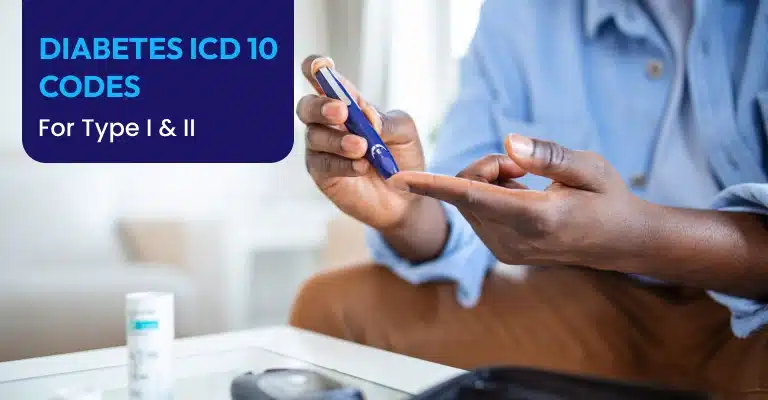
Menu

Type 2 diabetes is a common and chronic condition characterized by high blood sugar levels due to insulin resistance. Accurate coding of type 2 diabetes is essential for proper documentation, efficient billing, and effective patient care management.
The ICD-10 system ensures specific codes to different aspects of type 2 diabetes, providing that healthcare providers, medical billers, and coders can accurately record and bill for this condition.
This guide helps with the essential ICD-10 codes for type 2 diabetes mellitus, providing a detailed overview of how to use these codes for accurate billing.
Type 2 diabetes is a chronic condition where the body either resists the effects of insulin or doesn’t produce enough insulin to maintain normal blood glucose levels. This section discusses the disease’s causes, risk factors, and key aspects.
The causes of type 2 diabetes include genetic and lifestyle factors. Understanding these can help in accurate coding and documentation.
Causes of Type 2 Diabetes
Major Risk Factors
Accurate diagnosis of type 2 diabetes is crucial for effective treatment and management. This section explains common diagnostic tests and the appropriate ICD-10 code for documenting type 2 diabetes.
Different tests are used to diagnose type 2 diabetes. These tests help healthcare providers determine blood glucose levels and diagnose diabetes accurately.
The correct ICD-10 code for diagnosing type 2 diabetes is essential for accurate documentation and billing.
E11.9 – Type 2 Diabetes Mellitus Without Complications:
| ICD-10 Code | Description | Billable | Additional Codes |
| E 11.9 | Use for patients diagnosed with type 2 diabetes who do not have complications such as heart disease, kidney issues, or eye problems. | Yes | Z79.4 for long-term use of insulin. Z79.84 for long-term use of oral hypoglycemic drugs |
Accurate ICD-10 coding for type 2 diabetes is important for documentation and billing. This section discusses the primary codes and considerations for additional coding.
Additional codes are necessary to specify treatment methods and any long-term medication use. These codes provide a comprehensive view of the patient’s treatment plan.
Following are the common ICD-10 codes for type 2 diabetes:
| ICD-10 Code | Description | Billable |
| E11.9 | Type 2 diabetes mellitus without complications. Use for patients diagnosed with type 2 diabetes without any complications such as heart disease, kidney issues, or eye problems. | Yes |
| E11.0 | Type 2 diabetes mellitus with hyperosmolarity. Use when the patient presents hyperosmolarity without nonketotic hyperglycemic-hyperosmolar coma. | Yes |
| .E11.1 | Type 2 diabetes mellitus with ketoacidosis. Use when the patient has ketoacidosis without coma. | Yes |
| E11.2 | Type 2 diabetes mellitus with kidney complications. Use when the patient has diabetic nephropathy or other kidney issues. | Yes |
High blood sugar levels in type 2 diabetes can lead to various complications. Proper documentation of these complications is essential for patient care and billing.
Type 2 diabetes can cause a range of health issues that affect different parts of the body. Here are some of the most common complications:
| ICD-10 Code | Description |
| E11.22 | Type 2 diabetes mellitus with diabetic chronic kidney disease |
| E11.40 | Type 2 diabetes mellitus with diabetic neuropathy, unspecified |
Effective treatment for type 2 diabetes emerges through lifestyle changes and medications. This section outlines the key aspects of treatment to manage and control the condition.
Adopting healthy lifestyle changes is crucial for managing type 2 diabetes. These changes can help control blood sugar levels and improve overall health.
Diet:
Exercise:
Weight Management:
Medications are often prescribed to help manage blood sugar levels in patients with type 2 diabetes. The type of medication depends on the individual’s needs and medical history.
Oral Medications:
Injectable Medications:
Accurate coding and effective management of type 2 diabetes are crucial for patient care and billing. Understanding and using the correct ICD-10 codes ensures proper documentation and reimbursement. This guide explains the key aspects of coding for type 2 diabetes, including diagnosis, complications, and treatment. Implementing healthy lifestyle changes and appropriate medications supports the management of this chronic condition.
The ICD-10 code for type 2 diabetes without complications is E11.9.
Accurate coding ensures proper documentation, billing, and patient care management.
The ICD-10 code for type 2 diabetes with kidney complications is E11.22.
Common tests include Fasting Plasma Glucose (FPG), Oral Glucose Tolerance Test (OGTT), and Hemoglobin A1c (HbA1c).
Use Z79.4 for long-term insulin use and Z79.84 for long-term use of oral hypoglycemic drugs.



